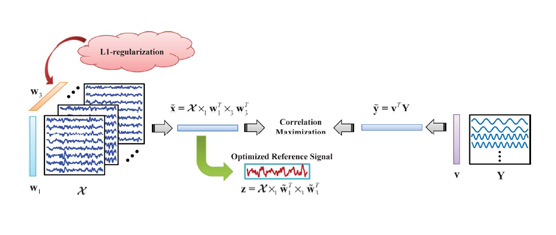Y. Zhang, G. Zhou, J. Jin, M. Wang, X. Wang, and A. Cichocki

Abstract
Canonical correlation analysis (CCA) between recorded electroencephalogram (EEG) and designed reference signals of sine-cosine waves usually works well for steady-state visual evoked potential (SSVEP) recognition in brain-computer interface (BCI) application. However, using the reference signals of sine-cosine waves without subject-specific and inter-trial information can hardly give the optimal recognition accuracy, due to possible overfitting, especially within a short time window length. This study introduces an L1-regularized multiway canonical correlation analysis (L1-MCCA) for reference signal optimization to improve the SSVEP recognition performance further. A multiway extension of the CCA, called MCCA, is first presented, in which collaborative CCAs are exploited to optimize the reference signals in correlation analysis for SSVEP recognition alternatingly from the channel-way and trial-way arrays of constructed EEG tensor. L1-regularization is subsequently imposed on the trial-way array optimization in the MCCA, and hence results in the more powerful L1-MCCA with function of effective trial selection. Both the proposed MCCA and L1-MCCA methods are validated for SSVEP recognition with EEG data from ten healthy subjects, and compared to the ordinary CCA without reference signal optimization. Experimental results show that the MCCA significantly
outperforms the CCA for SSVEP recognition. The L1-MCCA further improves the recognition accuracy which is significantly higher than that of the MCCA.

